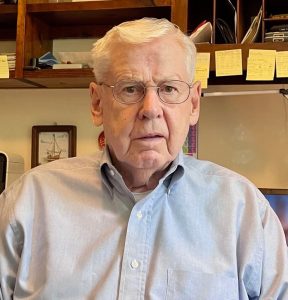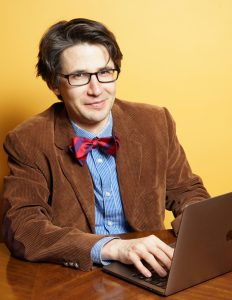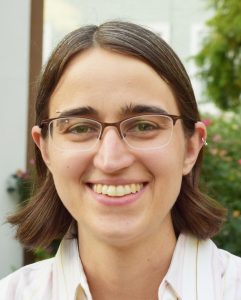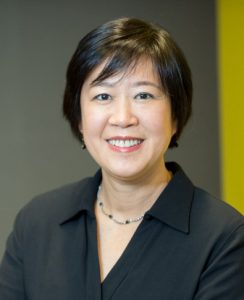Known as Project FRESH Air, it brings faculty and students together with local schools to monitor air quality, an on-the-ground way of building awareness of climate change and educating the next generation of climate activists.
McGroddy made a gift in support of the project. Then he learned about the University’s core curriculum revisions, aimed at fostering cross-disciplinary thinking, and decided to give again—seeing in the University’s various efforts the kind of forward-looking approach in which he has long sought to invest.

His new gift created the James C. McGroddy Award for Innovation in Education, which carries a cash prize. In April, the University announced the first recipients: three professors who had found an inventive way of teaching chemistry students about machine learning. (See related story.)
The gift reflects McGroddy’s deeply held belief in preparing students to handle future challenges—and seize future opportunities—that are just now taking shape.
“I see Fordham as aiming to lead change, being ahead of the wave rather than following, and that’s what motivates my support,” he said.
Forward-Looking Jesuit Education
McGroddy has long been familiar with Fordham. His father and brother graduated from the University, and he attended Jesuit schools himself—New York’s Regis High School and St. Joseph’s University in Philadelphia—before earning his doctorate in physics from the University of Maryland.
His views on education gelled during his student years and during his 32-year career with IBM, from which he retired as senior vice president of research in 1996. At St. Joseph’s, he studied electronic physics, a nontraditional major that combined in-depth education in science fundamentals with full-time work experience to prepare students for careers in the transistor and digital revolution, then in its infancy.
McGroddy credits much of his career success to that major, and education became one of his career’s through lines. During and after his IBM career, he focused on university-industry collaboration and served as a visiting lecturer and member of multiple university advisory boards and visiting committees, both in the U.S. and abroad. During a sabbatical from IBM he was a visiting professor at the Technical University of Denmark, and he later helped establish the IT University of Copenhagen.
Preparation for Health Care, Energy, Immunology Challenges
Since his retirement from IBM, a major focus for his philanthropy and consulting has been education, particularly science and technology education that balances “learning about” with “learning how to,” he said.
The emerging challenges for today’s students include developing alternative energy sources; building on “amazing” progress in the fields of genetic science and immunology; and changing the nation’s health care industry to create a system that achieves better results as well as lower costs, he said.
“Helping students develop a profile that will enable them to succeed, and lead, in the world which we imperfectly see ahead must be the key driver of educational innovation, and will be the hallmark of leading universities in the challenging years before us,” McGroddy said.
Learn about other opportunities to invest in academic excellence or other pillars of the Fordham experience at the site for the University’s $350 million fundraising campaign, Cura Personalis | For Every Fordham Student. To inquire about giving to any area of the University, please contact Michael Boyd, senior associate vice president for development and university relations, at 212-636-6525 or [email protected].
]]>Their method for introducing machine learning in chemistry classes has been honored with the inaugural James C. McGroddy Award for Innovation in Education, named for a donor who funded the award’s cash prize. (See related story.)
The recipients are Elizabeth Thrall, Ph.D., assistant professor of chemistry; Yijun Zhao, Ph.D., assistant professor of computer and information science; and Joshua Schrier, Ph.D., the Kim B. and Stephen E. Bepler Chair in Chemistry. They will share the $10,000 prize, awarded in April.
Chemistry and Computation Come Together
The three awardees’ project shows how to reduce the barriers to learning about programming and computation by integrating them into chemistry lessons. The project came together during the COVID pandemic—since chemistry students were working from their computers, far from the labs on campus, it made sense to give them some computational projects, in addition to experiments they could conduct at home, Thrall said.

Because little had been published about teaching machine learning to chemistry students, she got together with Schrier and Zhao to design an activity. Zhao, director of the Master of Science in Data Science program at Fordham, involved a student in the program, Seung Eun Lee, GSAS ’22, who had studied chemistry as an undergraduate.
Their first classroom project—published in the Journal of Chemical Education in 2021—involves vibrational spectroscopy, used to identify the chemical properties of something by shining a light on it and recording which wavelengths it absorbs. Students built models that analyzed the resulting data and “learned” the features of different molecular structures, automating a process that they had learned in an earlier course.

For another project, the professors taught students about machine-learning tools for identifying possible hypotheses about collections of molecules. Machine learning lets the students winnow down the molecular data and, in Schrier’s words, “make that big haystack into a smaller haystack” that is easier for a scientist to manage. The professors designed the project with help from Fernando Martinez, GSAS ’23, and Thomas Egg, FCRH ’23, and Thrall presented it at an American Chemical Society meeting in the spring.
Thumbs-Up from Students
How did students react to the machine learning lessons? According to a survey following the first project, 63% enjoyed applying machine learning, and 74% wanted to learn more about it.
“I think that students recognize that these are useful skills … that are only going to become more important throughout their lives,” Thrall said. Schrier noted that students have helped develop additional machine learning exercises in chemistry over the past two years.
Machine Learning in Education and Medicine

Zhao noted the growing applications of machine learning and data science. She has applied them to other fields through collaborations with Fordham’s Graduate School of Education and the medical schools at New York University and Harvard, among other entities.
The McGroddy Award came as a surprise. “I don’t think that we expected to win,” Schrier said, “just because there’s so many other excellent pedagogical innovations throughout Fordham.”
Eva Badowska, Ph.D., dean of the Faculty of Arts and Sciences at the time the award was granted, said the professors’ “path-breaking interdisciplinary work has transformed lab courses in chemistry.”
There were 20 nominations, and faculty members reviewing them “were humbled by the creativity, innovation, and generative energy of the faculty’s pedagogical work,” she said.
In addition to the McGroddy Award, the Office of the Dean of Faculty of Arts and Sciences is providing two $1,000 honorable mention prizes recognizing the pedagogy of Samir Haddad, Ph.D., and Stephen Holler, Ph.D., associate professors of philosophy and physics, respectively.
]]>